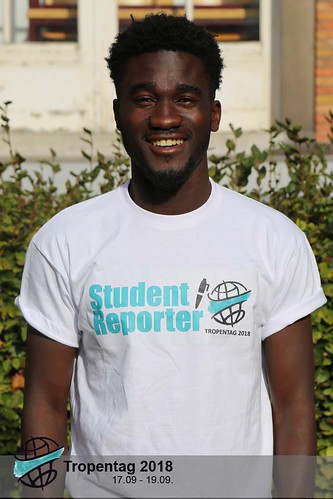agyei's blog

A Hero
Tue, 09/18/2018 - 19:59 — agyeiIn attendance of this year's Tropentag is the oldest among all other participants, Dr. Rainer Zachmann, a retired German phytopathologist. Earlier on in his research life, he worked for the CIP from the years 1973-1989. With his passion for developing countries, he worked for IITA also as a phytopathologist from 1989 to where he was mobile throughout sub-Saharan African countries including Nigeria, Ghana, Togo, Benin, among others.
Dr. Zachmann did not only work as a researcher in Africa but also availed himself as a trainer on all aspects of most valuable food crops in Africa such as maize, cassava, and yam. During this time, he developed research tours and conducted several workshops with the aim of improving agriculture in Africa. Dr. Zachmann spent close to a decade in Ibadan, Nigeria and due to his friendly manner he was fully integrated in his Nigerian community in Ibadan where he was named "Akinkanju" which literally means "warrior".
During the oral presentation sessions earlier today at the AUD E2, Dr. Zachmann was the fifth to give a presentation. It was obvious that the audience were tired and bored already. In the quest to revive the tired audience, Dr. Zachmann greeted the audience in four different languages which then sparked inspiration in the audience. This indeed justified that there is a true hero in the house.

More drought for better nutrition
Tue, 09/18/2018 - 18:48 — agyeiDuring this afternoon's oral presentation session "soil and soil fertility", a presentation from the project Healthy Land with controversial research title " Do we need more drought for better nutrition? - Water stress on nutrient content of food" was observed. Sahrah Fischers PhD work became center stage for discussion prior to the oral presentation given by Mr. Thomas Hilger in the absence of Sarah Fisher at this year's Tropentag. With such a conrtroversial heading, it wasn't surprising that the AUD E4 was almost filled to capacity with attendants who have been driven to the auditorium to unmask the villain.
Diving deeper into this research work, Mr. Hilger gave a clear introduction to this research by stating reasons why plants are important for human nutrition. Again, he pointed out clearly that with increasing extreme weather events, sudden drought periods can affect plant growth, bioavailability of nutrients and and quality of produced food. This then led to the aim of their study which was conducted in 2016 in two regions in East Africa (Kapchorwa, Uganda and Busia, Kenya) in order to identify whether drought have an impact on the nutrient composition of produced food.

Gringo
Sun, 09/16/2018 - 14:35 — agyei
Kwabena is a Ghanaian Masters student currently enrolled in the University of Bonn, studying Agricultural Science and Resource Management in the Tropics and Subtropics (ARTS). He strongly believes Tropentag is an event that bridges the gap between scientists and producers, and feels that this event summarizes his study and research interests. He therefore applied not just to be a participant of Tropentag 2018 but also a Student reporter. This adventurous and easy-going guy is a member of the interviewing and filming team. Kwabena says, "There wouldn't be lives on earth without Agriculturists, because they feed the world".




